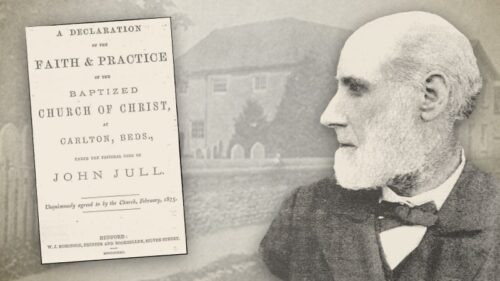
Definitions
“Strict”
The label refers to the doctrine of Close(d) Communion.
1. Churches which open the Lord’s Table to all who profess faith in Christ are called Open Communionists. Technically, however, they also observe a restricted Table since they make as a prerequisite one’s profession of faith in Christ.
2. Churches which put further restrictions on the Table are called Close(d) Communionists.
(1) Close Communionists welcome to the Table those who profess faith in Christ and have been baptized; or, those who profess faith Christ, have been baptized and members of churches belonging to the same faith and order.
(2) Closed Communionists welcome to the Table those who are in membership with that particular local church.
Although I believe Closed Communion to be aligned with scripture, the majority of Strict Baptist churches were Close Communion in practice.
“Particular”
The label refers to the doctrine of Limited Atonement (Particular Redemption), otherwise known as Calvinism. The first of these churches was organized in the year 1633, under the pastoral leadership of John Spilsbury, but they observed an open Table. The first Strict and Particular Baptist Church was organized in 1638, under the pastoral leadership of William Kiffin, who is sometimes called The Father of the Strict and Particular Baptists.
These 17th century churches wrestled with their soteriology and ecclesiology, paving the way for the development of these teachings during the 18th and 19th centuries. It was then the labels “Hyper-Calvinism” and “Strict Baptist” came into common use.
“Hyper-Calvinism”
The label has a twofold definition—historic and modern.
1. The historic definition is based on the doctrinal controversies between the Particular Baptist churches of the 18th and 19th centuries.
On the one side were those who rejected the doctrines of Duty-Faith, the Free-Offer and the Moral Law As A Rule Of Conduct For The Believer’s Life, represented by John Gill and William Gadsby. On the other side were those who subscribed to these doctrines, represented by Andrew Fuller and Charles Spurgeon. Those in Gill’s camp were called Gillites, or High and Hyper Calvinists. Those in Fuller’s camp were called Fullerites, or Moderate and Mongrel Calvinists. During the height of the controversy, the majority of Particular Baptist churches belonged to Gill’s camp. Today, those belonging to Gill’s teachings remain within the Particular Baptist circle, whereas those which followed Fuller’s doctrine were absorbed by the Reformed Baptist Denomination.
2. The modern definition is based on the presuppositions of Arminians and Fullerites.
Using as a spring board the Hyper-Calvinists’ rejection of the foregoing doctrines, they launch into wildly speculative and ludicrous charges. They surmise, if the Hyper-Calvinist rejects the doctrine of Duty-Faith, this must mean he/she doesn’t believe faith is necessary for salvation; or, he/she negates the responsibility of unregenerate sinners; or, he/she doesn’t view unbelief as a sin. They further surmise, if the Hyper-Calvinist rejects the doctrine of the Free-Offer, this must mean he/she doesn’t nurture a passion for the unregenerate; or, he/she doesn’t pray for the conversion of the unregenerate; or, he/she doesn’t have a zeal to evangelize; or, he/she doesn’t preach the gospel to the non-elect. They also surmise, if the Hyper-Calvinist rejects the Moral Law As A Rule Of Conduct For The Believer’s Life, this must mean he/she is an Antinomian; or, he/she turns the grace of God into a license for sin; or, he/she lives an unprincipled and ungodly lifestyle.
These summations are based on pure speculation and each of their conclusions is wrong! Nevertheless, this modern definition is passionately taught by Arminian and Fullerite preachers, and unquestionably received by their congregations. If you, the reader, are curious to discover the true meaning and implications of Hyper-Calvinism, then the AHB resources should prove helpful.
A Word Of Caution
There are other groups who identify as Hyper-Calvinists. They share similar conclusions with reference to the foregoing controversies. However, their path on reaching those conclusions differs widely from that of the Particular Baptists. It should not be assumed, therefore, that their teachings are one and the same with the Particular Baptists.
Jared Smith served twenty years as pastor of a Strict and Particular Baptist church in Kensington (London, England). He now serves as an Evangelist in the Philippines, preaching the gospel, organizing churches and training gospel preachers.
Jared Smith's Online Worship Services
Jared Smith's Sermons
Jared Smith on the Gospel Message
Jared Smith on the Biblical Covenants
Jared Smith on 18th Century Covenant Theology (Hyper-Calvinism)
Jared Smith on the Gospel Law
Jared Smith on Bible Doctrine
Jared Smith on Bible Reading
Jared Smith's Hymn Studies
Jared Smith on Eldership
Jared Smith's Studies In Genesis
Jared Smith's Studies in Romans
Jared Smith on Various Issues
Jared Smith, Covenant Baptist Church, Philippines
Jared Smith's Maternal Ancestry (Complete)





